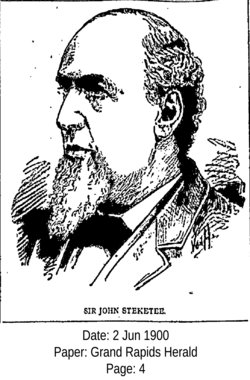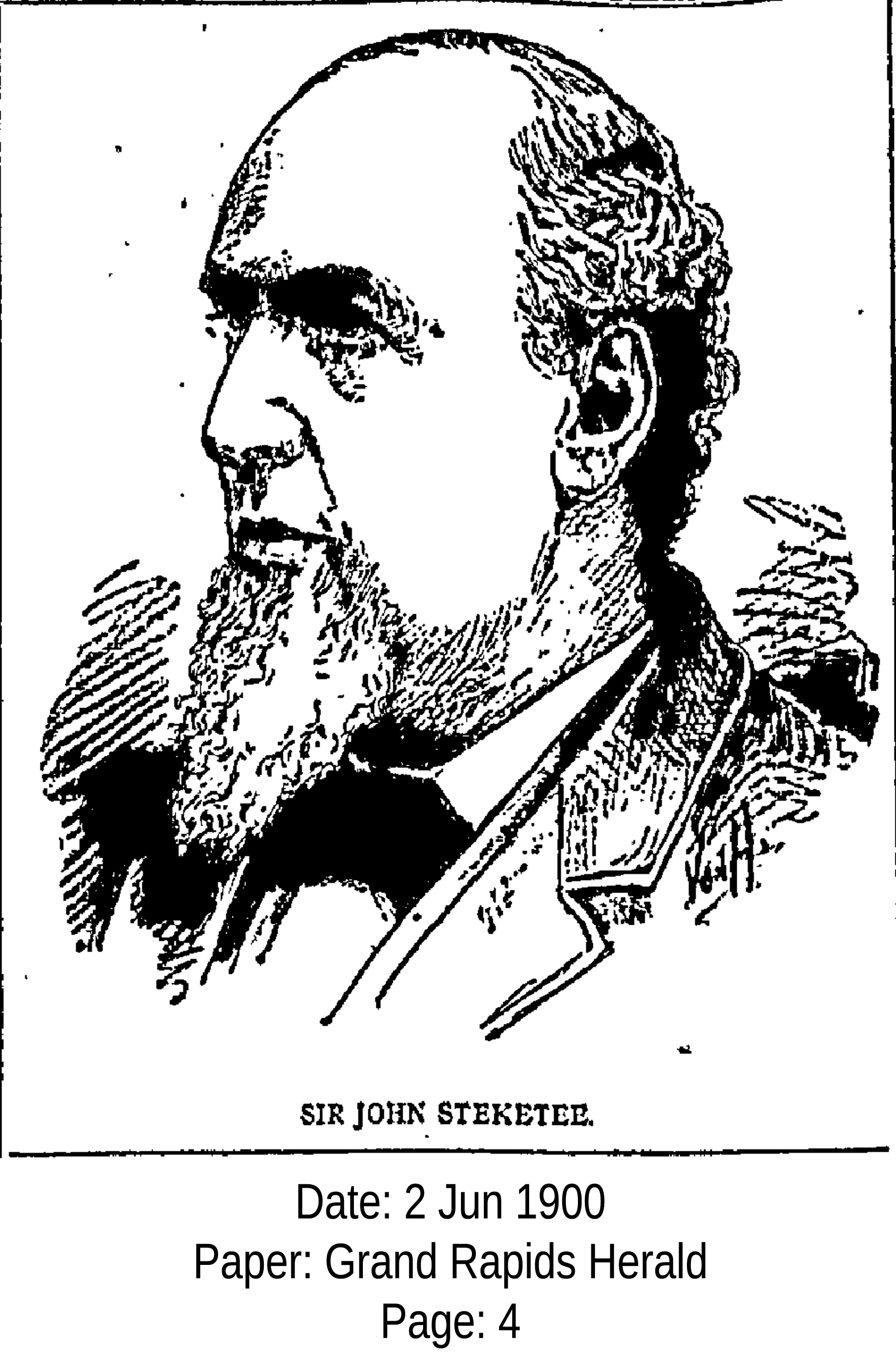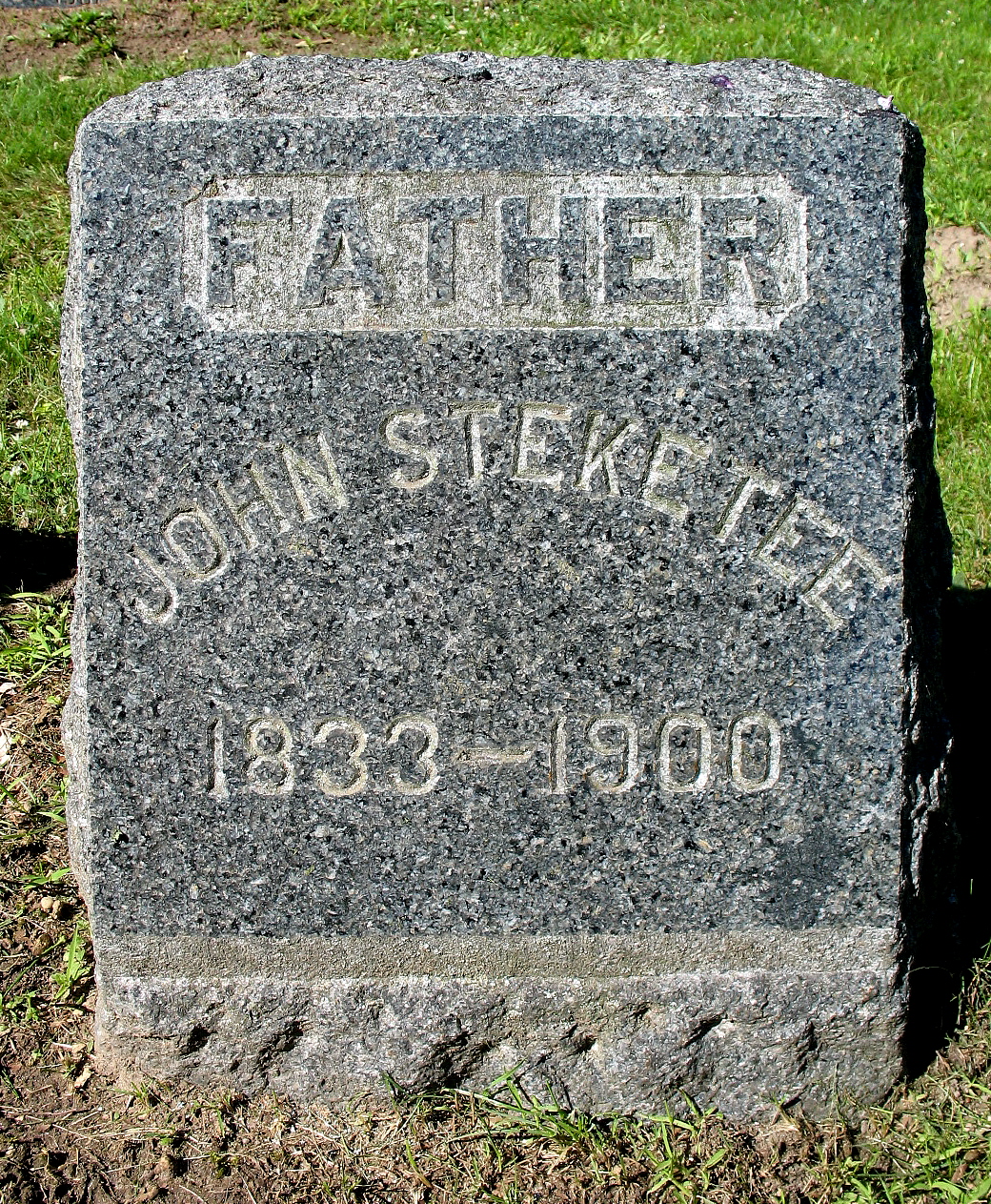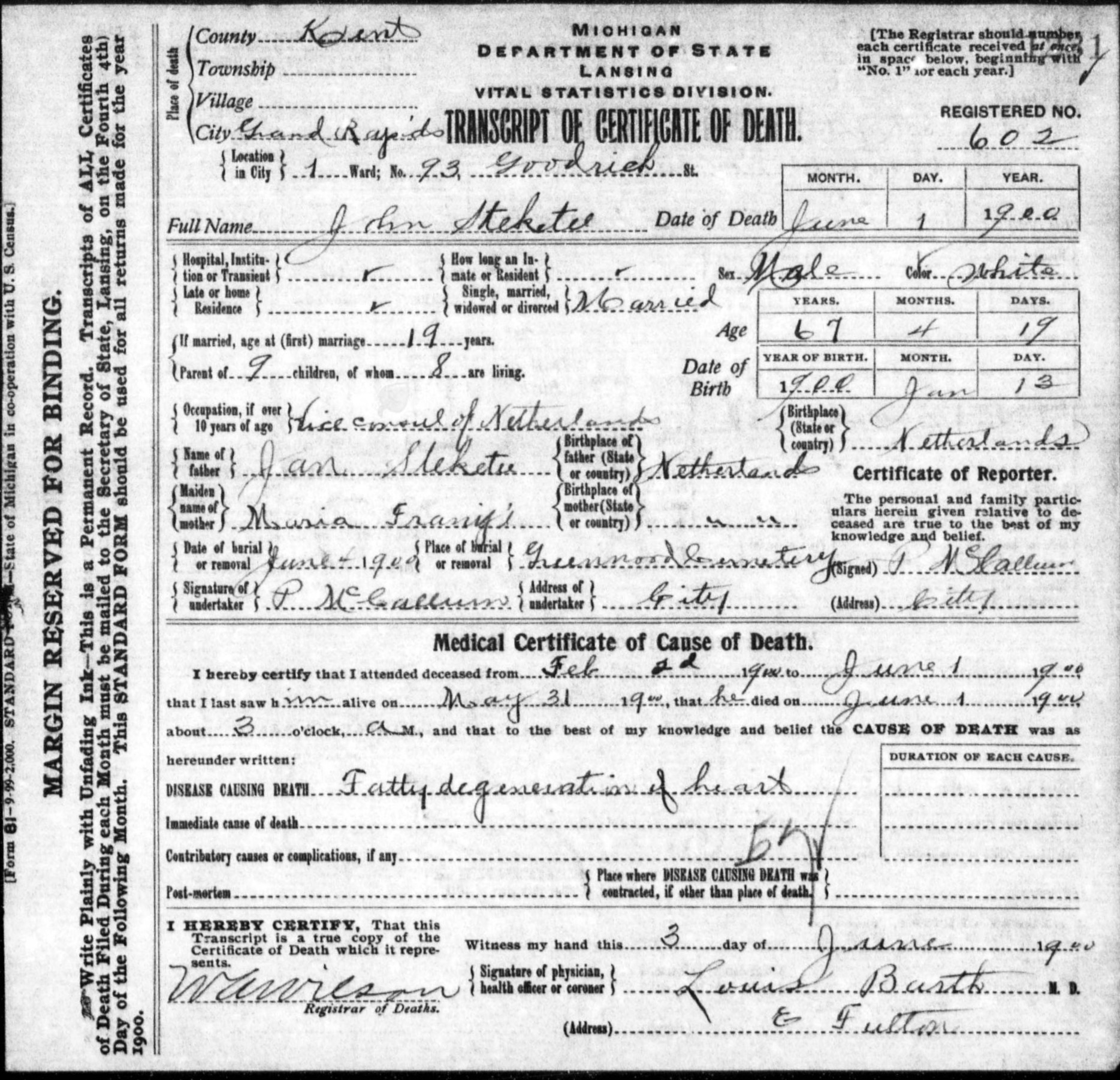[Excerpts taken from]:
Grand Rapids Evening Press, Pg. 9 - 14 April 1900
...Among the most prominent of all the local workers in the Boer cause and one who has been most conspicuously successful in his undertakings, is the venerable John Steketee, official representative of the Netherlands in this state, who has been honored with the degree of knighthood for valiant and faithful services performed in behalf of his country-men...
...John Steketee was a member of that little band of sturdy emigrants which blazed the way for the present Dutch civilization in Ottawa and Kent counties...
..."Just fifty-three years ago next Monday three shiploads of us sailed from Holland for America, " he said this week in conversation with Montagu White. "My father's family was the very first to sleep on the site of the present village of Zeeland, and I was one of the first of the Dutch settlers to locate in Grand Rapids. I am very sure that I was the first of the Hollanders to be married by a Yankee justice of the peace."
..."I was just 11 years old when we arrived," said John Steketee to the Press, "but I remember that and subsequent events very distinctly. We came by way of Albany and Buffalo to Detroit, arriving there on the Fourth of July. The troops were parading in honor of the day, and I remembered how frightened we all were at the appearance of the soldiers. Father called some of the older ones aside and advised that we move out of there immediately, as there seemed to be some sort of a war on. But when we learned that the people were only celebrating the anniversary of their Independence Day we were glad.
"We had come from Buffalo by a propeller steamer and we were in peril all the time because of the danger from fire. They kept some of us boys continually on the upper deck pouring water around the smokestack to keep the woodwork from catching fire. On the next trip after ours this steamer did catch fire and burned to the water's edge. We did not attempt to cross the state, but came around by water from Detroit to Mackinaw and down Lake Michigan, going first to Chicago. Our contact was for the steamer to carry us back to our destination on this side of the lake, near where the other party had located, but they refused to carry us and we had to hire a lumber vessel, which landed us at the point where the channel now runs from Black Lake into the big lake at Ottawa Beach and Macatawa perk. It is a little singular that many of us now have our summer cottages within sight of that very spot where we landed over fifty years ago, and that most of us, in spite of the adversities of those days are now prosperous enough to enjoy our declining years in summer homes.
"We remained but a short on the lake shore, just long enough to secure lumber from Saugatuck. With this we made great rafts and carried our party and belongings up Black Lake to the site of Holland city, where the Van Raalte party had been established but a few weeks. We were received with much enthusiasm, but wasted no time in frivolity. Ours was a stern mission and we resolved to push on at once. My father and us boys, together with other men of the party, went on to the site of the present village of Zeeland, and here, with the assistance of the Indians, we managed to get up our cabin. We sent back for the women, and our family was the first of them all to sleep where the hustling little town of Zeeland now is.
"Then commenced a season of the most trying experience," continued Mr. Steketee. "For two years we were left there to starve for there was little else than starvation for us. Few of us had any money, and what little there was gladly shared with the rest. There was no such thing as selfishness known among those people. But it was necessary to send from twenty to forty miles for provisions and carry them in upon the track, for we had no horses and no roads. And we not only had no way of getting money, but we could not get provisions from the soil. Arriving in the middle of the summer, we were too late to get a crop that year, and by the time we could make a clearing it was to late to plant for the next year. We did manage to get in a little corn, but it was poor and did not amount to much.
"The succeeding year was as terrible as any pioneer or any immigrants in the world ever experienced, and the Boers themselves could have had no more trying times. Here we were in a strange land, without food or money. It was a malarias climate, with unwholesome food, untrained marshes and insufficient shelter. Sickness came and death followed. I don't know how we ever survived it, but I do know that if it hadn't been for our pastors we would never have stayed there. If they had deserted us we would have disbanded and scattered. But they stayed by us nobly, rendering all assistance possible and when the next spring came and health returned we were able to take up our work with a spirit of earnestness and thanksgiving.
[Excerpts taken from]:
Grand Rapids Evening Press, Pg. 9 - 14 April 1900
...Among the most prominent of all the local workers in the Boer cause and one who has been most conspicuously successful in his undertakings, is the venerable John Steketee, official representative of the Netherlands in this state, who has been honored with the degree of knighthood for valiant and faithful services performed in behalf of his country-men...
...John Steketee was a member of that little band of sturdy emigrants which blazed the way for the present Dutch civilization in Ottawa and Kent counties...
..."Just fifty-three years ago next Monday three shiploads of us sailed from Holland for America, " he said this week in conversation with Montagu White. "My father's family was the very first to sleep on the site of the present village of Zeeland, and I was one of the first of the Dutch settlers to locate in Grand Rapids. I am very sure that I was the first of the Hollanders to be married by a Yankee justice of the peace."
..."I was just 11 years old when we arrived," said John Steketee to the Press, "but I remember that and subsequent events very distinctly. We came by way of Albany and Buffalo to Detroit, arriving there on the Fourth of July. The troops were parading in honor of the day, and I remembered how frightened we all were at the appearance of the soldiers. Father called some of the older ones aside and advised that we move out of there immediately, as there seemed to be some sort of a war on. But when we learned that the people were only celebrating the anniversary of their Independence Day we were glad.
"We had come from Buffalo by a propeller steamer and we were in peril all the time because of the danger from fire. They kept some of us boys continually on the upper deck pouring water around the smokestack to keep the woodwork from catching fire. On the next trip after ours this steamer did catch fire and burned to the water's edge. We did not attempt to cross the state, but came around by water from Detroit to Mackinaw and down Lake Michigan, going first to Chicago. Our contact was for the steamer to carry us back to our destination on this side of the lake, near where the other party had located, but they refused to carry us and we had to hire a lumber vessel, which landed us at the point where the channel now runs from Black Lake into the big lake at Ottawa Beach and Macatawa perk. It is a little singular that many of us now have our summer cottages within sight of that very spot where we landed over fifty years ago, and that most of us, in spite of the adversities of those days are now prosperous enough to enjoy our declining years in summer homes.
"We remained but a short on the lake shore, just long enough to secure lumber from Saugatuck. With this we made great rafts and carried our party and belongings up Black Lake to the site of Holland city, where the Van Raalte party had been established but a few weeks. We were received with much enthusiasm, but wasted no time in frivolity. Ours was a stern mission and we resolved to push on at once. My father and us boys, together with other men of the party, went on to the site of the present village of Zeeland, and here, with the assistance of the Indians, we managed to get up our cabin. We sent back for the women, and our family was the first of them all to sleep where the hustling little town of Zeeland now is.
"Then commenced a season of the most trying experience," continued Mr. Steketee. "For two years we were left there to starve for there was little else than starvation for us. Few of us had any money, and what little there was gladly shared with the rest. There was no such thing as selfishness known among those people. But it was necessary to send from twenty to forty miles for provisions and carry them in upon the track, for we had no horses and no roads. And we not only had no way of getting money, but we could not get provisions from the soil. Arriving in the middle of the summer, we were too late to get a crop that year, and by the time we could make a clearing it was to late to plant for the next year. We did manage to get in a little corn, but it was poor and did not amount to much.
"The succeeding year was as terrible as any pioneer or any immigrants in the world ever experienced, and the Boers themselves could have had no more trying times. Here we were in a strange land, without food or money. It was a malarias climate, with unwholesome food, untrained marshes and insufficient shelter. Sickness came and death followed. I don't know how we ever survived it, but I do know that if it hadn't been for our pastors we would never have stayed there. If they had deserted us we would have disbanded and scattered. But they stayed by us nobly, rendering all assistance possible and when the next spring came and health returned we were able to take up our work with a spirit of earnestness and thanksgiving.
Family Members
-
![]()
Cornelis Steketee
1831–1899
-
![]()
Paulus "Paul" Steketee
1834–1899
-
![]()
George G. "Gilles" Steketee
1834–1920
-
![]()
Paulina "Perlina" Steketee De Puit
1836–1897
-
![]()
Janna "Jane" Steketee De Vree
1838–1920
-
![]()
Andries Steketee
1840–1917
-
![]()
Corp Peter Paul Steketee
1845–1910
-
![]()
Peternella "Ellen" Steketee Hoffman
1846–1932
-
![]()
Bastian Steketee
1855–1928
Sponsored by Ancestry
Advertisement
Explore more
Sponsored by Ancestry
Advertisement
























